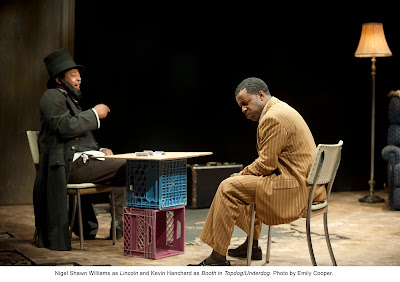Scene from COC production of Iphigenia in Tauris. Photo: Michael Cooper
Reviewed by James Karas
The Canadian Opera Company concluded its 2010-2011 season with a stunning production of Gluck’s Orfeo ed Euridice directed by Robert Carsen. In a brilliant move, General Director Alexander Neef, has chosen to launch the current season with a masterly production of another opera by Gluck, Iphigenia in Tauris directed by the same director.
Iphigenia in Tauris premiered in Paris in 1779 and has invariably been described as a masterpiece and perhaps Gluck’s best opera. The COC has never produced it before and it has teamed up with the Lyric Opera of Chicago, the San Francisco Opera and the Royal Opera House Covent Garden for this production. It is all worth it.
We all know that the creation of opera some four hundred years ago in Florence was intended to revive Greek tragedy, as it was perceived. Opera was supposed to be a perfect fusion of words, music and dance the way Aeschylus, Sophocles and Euripides did it when their plays were produced on the foothills of the Acropolis during the Golden Age of Athens.
Recreating Greek tragedy was a good idea then and it is a good idea now but we have sparse knowledge of how it was done. We have the texts of a handful of plays but almost nothing remains of the music or the dances that were fused with the words when they were staged at dawn so long ago.
Robert Carsen in his dark conception of Iphigenia in Tauris makes a convincing case for capturing some of the spirit of ancient drama. The music is provided by Gluck, of course, and the libretto is by Nicolas-Francois Guillard who remained fairly faithful to the play by Euripides.
Tauris in Scythia is a “barbaric” city on the east coast of the Black Sea where Iphigenia is a priestess in a temple dedicated to Diana. Iphigenia, you will recall, was supposed to be sacrificed by her father Agamemnon to appease Diana and get fair winds for the Greek fleet to sail off to Troy. Diana saved Iphigenia at the last second.
Years later, King Thoas of Scythia wants Iphigenia to sacrifice two strangers who have landed in Scythia. One of the strangers, unbeknownst to Iphigenia, is her brother Orestes. He killed his mother Clytemnestra in order to avenge the murder of his father by her. This is the ultimate irony: the victim of a sacrifice by her father is asked to sacrifice her own brother!
The opera opens in the temple of Diana during a violent storm and Iphigenia and the other priestesses are praying for calmness and protection from the gods. They are all dressed in black and the stage is also black. Carsen and Choreographer Philippe Giraudeau provide a ballet sequence that gives choreographic expression to the words and music of the scene. The scene could be done with Iphigenia and the chorus simply singing. It is not and it is a highly effective opening.
Carsen will follow the same style for the entire production. All the cast and chorus are dressed in black, the stage is black and the names of Iphigenia, Orestes and her parents are written in chalk on the walls.
Conception, design and direction play a crucial part in this production and I make no bones about my fascination and admiration for Carsen’s approach. Those qualities will only go so far, of course, without a first rate cast and orchestra and once again Neef and the COC have earned very high marks.
Soprano Susan Graham has almost co-opted the role of Iphigenia as her own and with good reason. She has four major arias to sing and carries much of the opera. The plot could hardly be more dramatic and she displays both vocal and acting ability to render an extraordinary Iphigenia. Her performance combines physical movement, emotional range and vocal splendour.
Orestes (baritone Russell Braun and Pylades (tenor Joseph Kaiser) are almost interchangeable in costume and conduct. They are close friends and each is willing to give up his life for the other. They gave unreservedly fine performances. I have serious reservations about bass-baritone Mark S. Doss’s singing in the role of King Thoas. Doss sounded rough and not quite up to the requirements of the production.
The chorus and ballet dancers were excellent. The COC orchestra was conducted by Pablo Heras-Casado in this outstanding night at the opera.
_____
Iphigenia in Tauris by Christoph Willibald Gluck with libretto by Nicolas-Francois Guillard opened on September 22 and will be performed eight times on various dates until October 15, 2011 at the Four Seasons Centre for the Performing Arts, 145 Queen Street West, Toronto, Ontario. Tel: 416-363-6671. www.coc.ca









